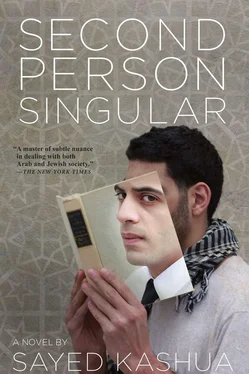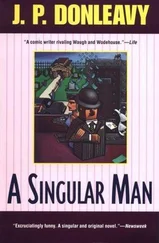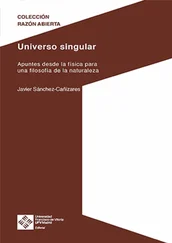They drove slowly, and I followed. For some reason I felt a burning desire to take photographs. It seemed to me like the only reasonable way to pass the next few minutes, behind the lens of a camera. To press, swivel, document, hide, distance myself from the events. But even if I had brought the camera with me, I doubt I would have had the nerve to use it. On Army Radio a famous Israeli singer spoke about his experiences during the past week, softening his voice, making it sound thoughtful, trying to enliven the banal conclusions that he had reached regarding his life.
“This next song has accompanied me during sad and happy days alike,” he said after he had finished his little speech and before he let the music speak for itself.
The ambulance entered the village and immediately drew the attention of the locals. Kids on bikes trailed behind the ambulance and pedaled furiously in their attempts to overtake the two-car convoy. The driver opened his window and told them something, probably that nothing exciting was happening, that this was just the body of a stranger being brought to burial, not someone from the village. A crowd tumbled out of the small mosque near the cemetery. The men stopped and stared at the ambulance and waited to see what was going on. I berated myself for forgetting that there was this little thing called Friday prayers and that it was the absolute worst time for a clandestine burial. I parked behind the ambulance and stayed inside the car. The driver turned around and threw me a look. Three men, one of whom seemed like the man in charge and the other two his helpers, came up to the ambulance driver and shook his hand, smiling. They exchanged a few words and looked over at me. A few of the worshippers came over and spoke with the men, whispering, and once they realized that it was not a villager who was being brought for burial and their curiosity had been satisfied, they left and went to report back to their friends that there was nothing to see.
I got out of the car only after all of the worshippers had dispersed. The driver’s assistant pulled Yonatan out of the ambulance and wheeled him toward a small room adjacent to the mosque, the two young men from the burial society trailing behind him.
“He can go to hell,” an elderly man said to me in Arabic as I stood there. “Who’s going to pray for this dog?”
“Shalom,” the man in charge of the burial service said to me in Hebrew. “Don’t worry about it, we’ll take care of this. You staying here?”
“Yes,” I said, not understanding exactly what was happening.
“He has no family members?”
“Not that I know of,” I said.
A little kid on a bike circled around us and yelled in Arabic, “How long are they going to bury collaborators here? How long?” The man in charge barked at him to get lost. “Sure,” the kid yelled. “What do you care? For you it’s good business. You couldn’t give a damn.”
“Get out of here, now,” the undertaker yelled, “or the first place I’m going to go after I’m done here is your father’s house. Get out of here.”
The kid pedaled off and the ambulance driver laughed and said the kid was right. “They’ve turned our cemetery into a garbage dump for foreigners,” he said in Arabic, and the undertaker looked at him apprehensively. “Don’t worry about it,” the driver said, looking at me. “He doesn’t understand a word, this one.” The stretcher was brought back to the ambulance and the driver and his assistant shook hands with the undertaker, bid him farewell, and drove off.
“You’re not a family member, right?” the undertaker asked me.
“No.”
“So, what is this, your job?”
“Yeah, among other things,” I found myself responding.
“You know how this works?”
“No.”
“The boys are washing him now. Then he goes into the mosque for a brief prayer and then we bury him. The grave has already been dug.” He pointed to a far-off corner of the cemetery. “Everything’s ready. You want some coffee?”
“No,” I said. “Thank you.”
The washing ceremony was brief. The two young men emerged with the body in a wooden coffin and hurried into the mosque.
“Just a second,” the undertaker said to me and jogged over to them. No prayer for the dead had been recited, of that I was sure. The coffin hadn’t been inside the mosque for more than a minute and the two men were coming out, carrying the coffin, walking briskly across the street that separated the mosque from the cemetery.
“Who died?” asked a driver who’d stopped his car.
“A foreigner,” the undertaker said. “ Allah yirachmo , a foreigner. A foreigner.”
The man drove off and the undertaker turned to me. “That’s it, they’re burying him,” he said. “If you’d like, you can leave a little something for the young men.”
“Yeah, let the little fucker pay,” one of the young men said as he walked with the coffin toward the grave. His partner laughed.
“Shut up,” the undertaker yelled at them, his face showing sorrow and disappointment.
“Of course,” I said, and I took two fifty-shekel notes out of my wallet.
“Thank you very much,” the undertaker said, parting from me quickly and walking toward the cemetery. I heard him say, “You’re making me look bad,” to the two men as they lowered the coffin into the ground. I got back in the car and started the engine. From afar I could see the heads of the two young men bending down to the ground and the undertaker directing them with his hands. I imagined that they had laid out the usual five blocks and that they were placing them on the body and then filling in the ditch with sand, spade by spade. I sat there and watched them work. One of the young men spat into the grave and laughed.
UNDERGROUND PARKING
The lawyer parked his car in the lot above King George Street. It was nearly nine in the morning. He turned off the engine and stayed in the car. The lawyer was scared. Where had all of this come from? He was afraid that this uncontrollable feeling would destroy his life and his career, make him lose his clientele and his livelihood. What was he worth without them? A month or two without any good cases and his life would start to unravel. The salaries, the mortgage, the car payments, taxes, shopping, his son’s nanny, his daughter’s school. The lawyer could see his life begin to crumble. Why had she done this to him? Didn’t she see that he’d been working like a mule to support them? He was always apprehensive that a young lawyer would come up and knock him off the top spot, but who would have thought that he’d be undone by matters of love and betrayal? Instead of showing up in court and representing an important client against charges of unlawful possession of a firearm, he was out and about on the streets, prowling around for his wife’s car like a jealous teenager.
There were five floors of underground parking at the Ministry of Social Affairs’ west Jerusalem office in Talpiot, and the lawyer drove slowly along the avenue of parked cars, eyeing each and every one.
Having not found his wife’s car, he made a U-turn and started back to the ground-floor exit. As he approached daylight, his phone announced two messages. The lawyer looked at the screen and saw that he had missed two calls while underground. One from Samah and one from his wife. He called his wife but once again she did not answer. The lawyer left Talpiot and drove toward the mental health clinic where his wife worked two or three days a week. What did she do there exactly? he wondered as his phone rang again.
“Is everything all right?” she asked. “I saw you called but I couldn’t answer because I’m in a meeting and my phone is on silent. I just stepped outside. Is everything okay?”
Читать дальше












